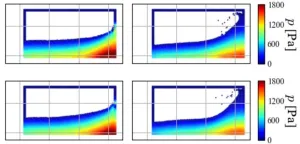Riding the AI wave toward rapid, precise ocean simulations
New machine learning model cuts fluid simulation time from 45 minutes to 3
2025-04-03
(Press-News.org)
AI has created a sea change in society; now, it is setting its sights on the sea itself.
Researchers at Osaka Metropolitan University have developed a machine learning-powered fluid simulation model that significantly reduces computation time without compromising accuracy. Their fast and precise technique opens up potential applications in offshore power generation, ship design and real-time ocean monitoring.
Accurately predicting fluid behavior is crucial for industries relying on wave and tidal energy, as well as for design of maritime structures and vessels. Whilst particle methods — which allow particles to simulate the behavior of fluid flow — are a common approach, they require extensive computational resources, including processing power and time. By simplifying and accelerating fluid simulations, AI-powered surrogate models are making waves in fluid dynamics research.
However, AI is not without its flaws.
“AI can deliver exceptional results for specific problems but often struggles when applied to different conditions,” said Takefumi Higaki, an assistant professor at Osaka Metropolitan University’s Graduate School of Engineering and lead author of the study.
Aiming to create a tool that is consistently fast and accurate, the team developed a new surrogate model using a deep learning technology called graph neural networks. The researchers first compared different training conditions to determine what factors were essential for high-precision fluid calculations. They then systematically evaluated how well their model adapted to different simulation speeds, known as time step sizes, and various types of fluid movements.
The results demonstrated strong generalization capabilities across different fluid behaviors.
“Our model maintains the same level of accuracy as traditional particle-based simulations, throughout various fluid scenarios, while reducing computation time from approximately 45 minutes to just three minutes,” Higaki said.
This research marks a step forward in high-performance fluid simulation, offering a scalable and generalizable solution that balances accuracy with efficiency. Such improvements extend beyond the lab.
“Faster and more precise fluid simulations can mean a significant acceleration in the design process for ships and offshore energy systems,” Higaki said. “They also enable real-time fluid behavior analysis, which could maximize the efficiency of ocean energy systems.”
The study was published in Applied Ocean Research.
###
About OMU
Established in Osaka as one of the largest public universities in Japan, Osaka Metropolitan University is committed to shaping the future of society through the “Convergence of Knowledge” and the promotion of world-class research. For more research news, visit https://www.omu.ac.jp/en/ and follow us on social media: X, Facebook, Instagram, LinkedIn.
END
[Attachments] See images for this press release:

ELSE PRESS RELEASES FROM THIS DATE:
2025-04-03
Big appliances, like washing machines, ovens and refrigerators, are a major investment for many households. Consumers hope that these appliances will last for decades. More and more, however, people have the perception that these big-ticket items might not be lasting as long as they once did.
But when Kamila Krych looked at actual trends in product lifetimes as a part of her PhD research at the Norwegian University of Science and Technology's (NTNU) Industrial Ecology Programme, she found that wasn’t quite true.
“Despite what people think, there is no evidence that product lifetimes are decreasing,” she said. “Many people think that products have been becoming ...
2025-04-03
Organoids have revolutionized science and medicine, providing platforms for disease modeling, drug testing, and understanding developmental processes. While not exact replicas of human organs, they offer significant insights. The Siegert group at the Institute of Science and Technology Austria (ISTA) presents a new organoid model that reveals details of the developing nervous system’s response to viral infections, such as Rubella. This model could influence pharmaceutical testing, particularly benefiting drug safety for pregnant ...
2025-04-02
A new study has found that the world’s finest yodellers aren’t from Austria or Switzerland, but the rainforests of Latin America.
Published in the journal Philosophical Transactions of the Royal Society B and led by experts from Anglia Ruskin University (ARU) and the University of Vienna, the research provides significant new insights into the diverse vocal sounds of non-human primates, and reveals for the first time how certain calls are produced.
Apes and monkeys possess special anatomical structures in their throats called vocal membranes, which disappeared from humans through evolution to allow for more stable speech. However, ...
2025-04-02
Differences in the distribution of certain proteins and markers in the brain may explain why some people first experience vision changes instead of memory loss in Alzheimer’s disease, finds a new study by UCL researchers.
Posterior cortical atrophy (PCA) is a rare form of Alzheimer’s disease that, rather than causing problems with memory, leads to difficulties with reading, navigating, and recognising objects. Studies suggest that one in 10 patients with Alzheimer’s disease have a form which is visual, rather than memory led.
As well as presenting with unusual symptoms, ...
2025-04-02
New research to be presented at this year’s European Congress on Obesity (ECO 2025, Malaga, Spain, 11-14 May) suggests that weight loss programmes targeting a particular % weight loss are often failing, and that other factors should be considered including improvement of obesity-related complications, enhancing quality of life and overall physical and social functioning. The research is by an international team including Dr Sanjeev Sockalingam, Obesity Canada and the Centre for Addiction and Mental Health, Toronto, Ontario, Canada, and colleagues.
Identifying the most appropriate targets for obesity management is crucial due to the complexity of obesity ...
2025-04-02
By most accounts, confidence is a prerequisite for workplace success. What if it could be trained, even subtly rewired, using something as simple as a smartphone app?
That’s the premise behind a first-of-its-kind study from the University of California, Riverside, where psychologists tested whether workers could reshape their self-image through a digital tool that reinforces positive beliefs.
The findings, published in Computers in Human Behavior Reports, suggest they can—and that belief systems, often assumed to be deeply ...
2025-04-02
New York City's automated speed cameras reduced traffic crashes by 14% and decreased speeding violations by 75% over time, according to research from NYU Tandon's C2SMARTER published in Transportation Research Interdisciplinary Perspectives that tracked more than 1,800 cameras across school zones from 2019 to 2021.
With speeding contributing to approximately one-third of all motor vehicle fatalities nationwide, these findings translate to potentially hundreds of lives saved in America's most densely populated city.
The ...
2025-04-02
If someone picks up a newspaper in China, there’s a good chance it contains some government propaganda masquerading as news, according to a new study co-led by a University of Oregon expert.
Hannah Waight, an assistant professor of sociology at the UO, and her collaborators found that the use of state-planted propaganda is on the rise in China. And it’s not just a tool for spreading ideological content. It’s also used to control and constrain other kinds of information beyond political ideals, including natural disaster and public health ...
2025-04-02
PROVIDENCE, R.I. [Brown University] — Comparing wealth and survival rates in the U.S. with those in Europe, researchers found that over a 10-year period, Americans across all wealth levels were more likely to die than their European counterparts.
The findings were detailed in a new study in the New England Journal of Medicine by a team led by researchers at the Brown University School of Public Health.
The analysis compared data from more than 73,000 adults in the U.S. and different regions of Europe who were age 50 to 85 in 2010 to ...
2025-04-02
At only two days old, Sophie was losing too much weight, and too quicky.
Further genetic testing would show that Sophie has one of a group of rare conditions called CODE (congenital diarrhea and enteropathies) that disrupts the function of cells in the intestine, causing diarrhea and preventing infants from absorbing the nutrients they need to grow and thrive. For Sophie’s parents, Samantha and Kyle, this meant a complete re-envisioning of the life they had expected as a family.
“Suddenly, our days were filled with medical treatments and frequent hospital visits, requiring us to adjust to being not ...
LAST 30 PRESS RELEASES:
[Press-News.org] Riding the AI wave toward rapid, precise ocean simulations
New machine learning model cuts fluid simulation time from 45 minutes to 3



